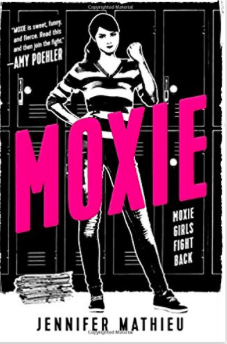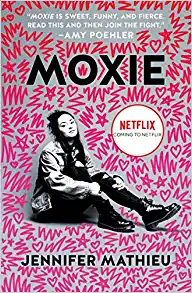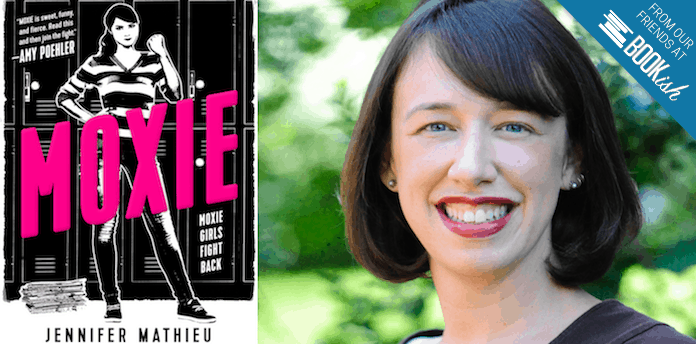Moxie by Jennifer Mathieu
BookTrib is partnering with Bookish to bring you more great content. Picking a favorite book can be tough for any reader, but we can’t deny that Jennifer Mathieu’s Moxie is high on our list. This young adult novel takes readers to an average high school where a quiet girl named Vivian decides that she’s done putting up with sexist behavior. Inspired by her mom’s punk rock zines from the 90s, Viv decides to start a feminist movement, encouraging other girls to join together, stand up, and fight back. Here, Mathieu talks about young feminists today, the importance of intersectionality, and why this book is a love letter to her students.
 Bookish: You dedicate this book to teens and women fighting for equality, but also to a teacher who called you a “feminazi.” How, at a young age, did you find the strength to turn an insult like that into an empowering desire to learn more about feminism?
Bookish: You dedicate this book to teens and women fighting for equality, but also to a teacher who called you a “feminazi.” How, at a young age, did you find the strength to turn an insult like that into an empowering desire to learn more about feminism?
Jennifer Mathieu: I’m not really sure! At the time that teacher insulted me, I knew that it hurt inside and was deeply humiliating. However, in my gut I also knew that the teacher was wrong. I hadn’t explicitly started calling myself a feminist yet, but again, I knew the teacher was not correct in using that term and I knew he wasn’t correct in taking sexist stances in class, which he did so often. It was a challenging experience and at the time I didn’t speak out against him like I now wish I would have. With hindsight, I can see how transformative this experience was for me because it was one of the first times I felt like I was being ridiculed for holding beliefs I knew were good and true.
Bookish: What does having moxie mean to you?
JM: To me having moxie means having guts and gumption. It means speaking your mind, speaking truth to power, and resisting in ways big and small.
Bookish: It’s easy to be caught off guard when something demeaning or sexist happens to you. Through Viv and her friends, you’ve offered readers a script of sorts: things to say or do in those situations. Was that something you were conscious of when you were writing?
JM: I think so, yes. I’ve always shied away from writing for teenagers with any sort of preachy tone because teenagers can see right through that sort of thing. That said, I think Moxie is the closest I’ve ever come to writing a book that I hope teenagers, especially teenage girls, can use as a touchstone or guide as they navigate the world around them. They may not necessarily mimic exactly what Vivian and her friends do, but they might just be inspired by them and come up with their own ways of reacting when confronted with sexism.
Bookish: The book opens with quotes from real teenage girls. How have your experiences as a high school teacher helped to shape the world of this novel?
JM: My female students inspire me every single day. I have been co-sponsor of the feminist clubs at the schools I’ve worked at, and it’s so wonderful to be able to watch young women (and men!) discover gender equality and to fight for it! Young feminists today have a much more intersectional view of the world, and they’re so convinced of their ability to change the world for the better. I love it! At the same time, so much of the garbage that I faced as a teenage girl still exists in high schools today. As a teacher I call it out when I see it, but so much of it goes on when I’m not looking. Writing Moxie felt like a love letter and a thank you letter to my students sort of wrapped into one.
Bookish: Some of the sexism in the book is so extreme (school dress codes, the bump-n-grab) that it feels out of a dystopian novel. But as readers we know that these are real things happening in real schools to real girls. What was it like writing those scenes?
JM: Honestly, I have regular moments of feeling like we live in some dystopian world given everything that happens to women and girls in this country and this world! As for what happens to Vivian and her friends, everything that happens in Moxie I’ve either experienced or witnessed, so I knew I wasn’t making it fantastical and I knew girls and women would relate. Writing it was so validating, though, because I gave these girls the tools to confront their situations and they confronted them and won. That doesn’t always happen in real life, unfortunately.
Bookish: You include a number of well-meaning characters who don’t “get” the movement at first—from a best friend who is disinclined to use the word feminist to a boyfriend whose mantra is “not all guys are like that.” Why was it important for you to feature characters like these?
JM: When I got to college and really heard the word “feminist” and what it meant I jumped in with both feet. I was an immediate believer because I quickly made connections between my lived experience and what the feminist movement was fighting for. I felt like I’d met my tribe. But I also know that for a lot of women and girls the word feminist has a negative connotation, mostly due to how it’s represented in popular culture or because of things they hear from their families. I wanted those girls to feel like they had a place in Moxie, too, and it’s my hope that even if at the end of the book they don’t necessarily feel comfortable embracing “the f word,” they do feel comfortable fighting for their rights.
As for the character of Seth, I wanted to create a believable guy who means well but doesn’t always get it, because so many men and guys I’ve encountered over the years think and act like Seth. Really decent guys who mean well but are still learning and who can benefit from feminism, too. I just wanted a variety of entry points into Moxie. I wanted this book to have as broad of an appeal as possible because I believe in its message so much.
Bookish: Viv often feels empowered and energized when she’s making the Moxie zines. What were you feeling as you created them, and this book?
JM: I felt like I was traveling back in time. In the late 90s and early 00s I made a zine about my life called Jennifer (I’ve never been so hot when it comes to titles, obviously) and it was such a fun, creative outlet for me. I used to put on music and make my zine that was full of silly stories and cartoons about my life in my early 20s. It was just a joyful time of self-expression. I felt that again when I was creating Moxie, but there was an additional layer of excitement because I knew more readers would be able to connect with these zines than they ever did with my Jennifer zine. (And I think that’s a good thing!) Overall, writing this book was such a joyful experience. I put on Bikini Kill and started typing. It was so much fun.
Bookish: Viv is a truly relatable protagonist for this story because she experiences a lot of fear. She’s afraid to be seen, heard, judged. She’s angry but often silent. What message do you most hope she brings to girls like her, who want to stand up but maybe don’t know how or are afraid of what will happen if they do?
JM: I was a lot like Viv when I was in high school. I spoke up a bit more, but I was more Viv than Lucy. I was also terrified of what other people thought of me and was super anxious to fit in. In many ways, writing Vivian’s story was a bit of wish fulfillment for me. I was getting the chance to rewrite my past with what I know now. There are so many times, looking back, that I wish I’d stood up and spoken my mind when I was in my teens. It’s my hope that Vivian inspires some girls to not be afraid to speak up for themselves.
Bookish: You cover a lot of feminist territory in the book, from its history to its intersectionality problems to its modern connotations. Which aspect of it was the most challenging to write about?
 JM: I would say my top concern was making sure I made the book as intersectional as possible. The feminist movement has often struggled to include and amplify voices beyond those belonging to white, straight, middle class women. The Riot Grrrl movement was more progressive in terms of its inclusion of queer women, but it was still a primarily white movement. I have zero interest supporting white feminism or a feminist movement that erases and ignores voices of women of color, queer women, trans women, women with disabilities, and other women from marginalized groups. So I knew I wanted to address intersectionality in a very explicit way within certain scenes and with certain characters. At the same time, I didn’t want the book to feel like an after school special with “the gay girl” and “the black girl”—just these perfunctory stand-ins for bigger groups. I was determined to write a book that painted feminism as a big tent, and I want young women to be able to talk about this aspect of the feminist movement with openness. There’s so much work to be done in this area and it’s my hope that Moxie sparks some important conversations. Hopefully I pulled it all off in a way that felt believable even though I know no writer is perfect and I’m super open to feedback.
JM: I would say my top concern was making sure I made the book as intersectional as possible. The feminist movement has often struggled to include and amplify voices beyond those belonging to white, straight, middle class women. The Riot Grrrl movement was more progressive in terms of its inclusion of queer women, but it was still a primarily white movement. I have zero interest supporting white feminism or a feminist movement that erases and ignores voices of women of color, queer women, trans women, women with disabilities, and other women from marginalized groups. So I knew I wanted to address intersectionality in a very explicit way within certain scenes and with certain characters. At the same time, I didn’t want the book to feel like an after school special with “the gay girl” and “the black girl”—just these perfunctory stand-ins for bigger groups. I was determined to write a book that painted feminism as a big tent, and I want young women to be able to talk about this aspect of the feminist movement with openness. There’s so much work to be done in this area and it’s my hope that Moxie sparks some important conversations. Hopefully I pulled it all off in a way that felt believable even though I know no writer is perfect and I’m super open to feedback.
Something I’m really excited about is the Moxie Tumblr. It’s being run by a former student of mine, a Latina who understands the importance of intersectionality and who is embracing it so beautifully on our amazing Tumblr. You can check out her original art and other awesomeness at moxiegirlsfightback.com.
Bookish: Moxie was already written at the time of the January 21st Women’s March, but there are some clear parallels between the march and one particular scene in the book. Looking back on that scene, did you feel the connection between it and the march?
JM: There is a scene in Moxie that parallels the march, yes, and I’d written it before the march took place. When I marched in January I thought about Vivian and her friends, about all the Moxie Girls, and I knew if they existed for real they would absolutely be marching with me. In my heart, they were.




